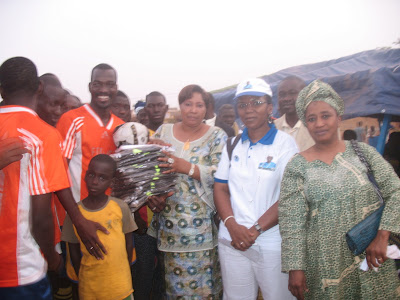
Mali is an interesting country for a multitude of reasons. From a political science perspective, it's particularly interesting because its had 2 peaceful turnovers of power, and 4 Presidential elections since it's democratic transition in 1991. Mali also happens to be one of the poorest countries in the world (about $300 GDP per capita) and over 90% Muslim - two characteristics that are rare for "democracies."
A little background on Malian Political History for all you who might be interested... Moussa Traore staged a military coup in 1968, removing Mali's first President - Modibo Keita from power. He ran the country in a military dictatorship until violent government response to student/civil society protests led to another coup d'etat (by current President and then military man) "ATT". ATT led a transitional govt for a year, but then stepped down to allow for democratic elections. Alpha Konare, former University Professor and Democratic activist, won Mali's first democratic elections with the backing of his newly formed party - ADEMA. After completing his second term, Konare stepped down from power and ATT ran for President as an independent and won. He is now serving his second 5 year term.
Mali held communal elections last Sunday - every district elects Mayors and various members of de-centralized government. It is a complicated system of proportional representation - where parties are elected and depending on the percentage of votes they get - they divvy up the positions. ADEMA (Konare's party and the current majority party in the senate) swept all but one district in Bamako and most regions. ADEMA is a well-financed, well organized political machine. And for communal elections - money and organization really matters. Sad to say, there were few debates about political issues. Some parties claimed to be the voice of women or young people - some promised electrification, some wanted to fight corruption. The build up to elections, included soccer games and sponsored concerts. Candidates invite the community to watch these spectacles and then say "vote for me" at the end. (The picture above is of my Aunt Djeneba - who ran for mayor of our commune handing out soccer jerseys and cash to the winning team at the soccer game she sponsored). My brother in law - played in finals one of these soccer games sponsored by ADEMA and the cash prize for his team was $1000! Each player got $30- more than some people make in 2 weeks of work.
Come election day - the different parties rent sotramas and round up people to vote for them. I had 3 teams of students/RAs doing exit polls at different voting stations. In fact, it was very hard to get local transport on election day, because all the sotramas had been rented. All 3 of my teams noted rampant vote buying (for about $2 or sometimes a sandwich and coffee). The polling station I visited seemed pretty relaxed (a far cry from what I saw in Kenya in Jan 08). Perhaps it is because its communal elections so lower stakes - no observers and minimal police control (unless there are allegations of fraud). All parties seemed to be engaging in the same kind of mobilization - get people in a sotrama - bring them to the polls and then reward them with some cash or food or something.
So, how "democratic" are these elections. Democracy is a really tricky thing to qualify (political scientists debate this a lot). However, despite all the vote-buying and pomp and circumstance seemingly void of content - Malians were in control. Unlike what happened in Kenya last year, there did not appear to be tampering behind closed doors after the public had voiced their choices. If fraud happened, the voters were complicit in it. This doesn't make the elections clean or perfect, but it makes me hopeful. Hopeful that the right candidate with the right message and network of support could create change.
A nice story came out of Commune 4. The incumbent mayor, running as "the Obama of Mali," beat all of the major parties. His independent party came in first. Why? Well, he has performed during his tenure - building infrastructure for the community and managing his commune budget well.
You had 3 teams doing exit polls??? Pretty awesome, you are almost a sociological force to be reckoned with.
ReplyDeleteIt's good to see some hopeful signs. Vote buying when votes actually count is much less of a problem then vote-stealing. It was hanging with Drissa over the weekend..
ReplyDeleteIgor